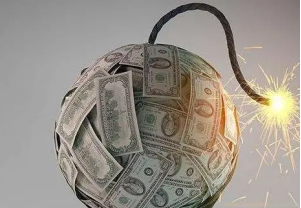Recession risk boosts bond traders to return to safe-haven trading strategies
Traders flocked to government bonds and safe-haven currencies as fears over the prospect of a recession intensified. European bonds and U.S. Treasuries surged after two days of losses. A revival in safe-haven demand has also boosted inflows into the dollar and yen, which has lifted the yen from a fresh 24-year low. Economists have warned that the global economy is at risk of recession as central banks push ahead with an aggressive cycle of rate hikes regardless of growth risks. In Britain, traders are already betting that recession fears will limit the Bank of England's ability to raise interest rates. British government bonds rose as May inflation data came in as expected and money markets pared bets that the Bank of England will raise interest rates three times in a row by 50 basis points. The yield on the 2-year Treasury note, the most sensitive to monetary policy, fell 18 basis points.
Hedge funds flee the gold market in anticipation of Fed rate hikes
Hedge funds have fled the gold market on expectations the Federal Reserve will raise interest rates by the most in 28 years, according to the latest holdings data from the U.S. Commodity Futures Trading Commission (CFTC). While investors quickly dumped long positions in gold and added bearish positions, some analysts noted that sentiment remained fairly neutral. Gold prices are still oscillating in the area between support at $1,800 and resistance at $1,850.
Global central banks are accelerating the pace of interest rate hikes
Central banks around the world are raising interest rates faster. Following the previous announcement by the United States, Brazil, Switzerland, the United Kingdom, Argentina and other countries to raise interest rates, this week, the European Central Bank, the Bank of Korea, and the Central Bank of Australia have issued remarks on continued tightening. Economists also pointed out that monetary tightening policy is necessary to control inflation, but in the context of the current slowdown in global economic growth, we should be wary of policies that are too aggressive and lead to an increase in the risk of economic recession.
It is expected that the near-term outlook for oil prices may be further bleak
The recent rally in oil prices is quickly reversing as investors worry that the tightening action by central banks will lead to a wider economic slowdown. Musk, "Dr. Doom" Roubini and Goldman Sachs have all warned of a possible future recession that will cripple energy demand. The near-term outlook for oil prices is expected to dim further as concerns about crude demand dominate.
Russia has become the largest supplier of crude oil to China
According to data released by the General Administration of Customs of China recently, Russia has become the largest supplier of crude oil to China. According to data from the General Administration of Customs, in May this year, China imported about 45.82 million tons of crude oil, of which 8.42 million tons were imported from Russia and 7.82 million tons from Saudi Arabia. Asia saved Russia's crude production. Far from falling further, Russia’s crude oil production is almost close to pre-pandemic levels.
BoE needs to take sterling exchange rate into account when assessing inflationary pressures
Peel, the Bank of England's chief economist, said the central bank needed to take the pound into account when assessing inflationary pressures, though he was concerned that using monetary policy to stabilize the pound would distract the Bank of England from its target. According to Refinitiv's calculations based on interest rate futures, the probability of the Bank of England raising interest rates by 50 basis points on August 4 is currently 73%. In other words, in terms of anti-inflation, the Bank of England is very likely to break the current cautious pace and adopt an aggressive rate hike rhythm.
Yen hits historic lows
The Bank of Japan voted 8-1 to maintain its short-term interest rate target at minus 0.1 percent and its pledge to steer 10-year bond yields to near zero. The decision was widely expected but put the BOJ's stance further apart from other major central banks. While currency stability is important to achieving its price target, it will not focus on yen movements to guide policy. Affected by the above-mentioned macro news, the yen was sold off heavily in both straight and cross trading, causing its exchange rate to hit historically low levels.
The "side effects" of the recession appear
While actively fighting high inflation, central bankers and economists are widely concerned that aggressive tightening to control inflation could tip the economy into recession at a time when global growth is already slowing. A global financial crunch is triggering a return of venture capital. As the world raises interest rates rapidly and synchronously, capital begins to flee risk assets such as stocks and flows to other safe-haven assets, and its "side effects" on curbing economic growth prospects are beginning to appear. The U.S. Dow and European stock indexes are down more than 17% compared to the end of 2021. The S&P lost about 6% last week, its biggest weekly drop since the pandemic. An index of emerging market bonds tracked by Bloomberg also fell.
The Fed is expected to raise interest rates again strongly in July and September
The survey shows that the Fed is forecast to raise interest rates by another 75 basis points in July and 50 basis points in September, before reducing the rate hike to 25 basis points until November at the earliest. Despite heightened recession fears and a deep sell-off in financial markets, the incentive for the Fed to do more remains. In the June 17-21 survey, nearly three-quarters of analysts (67 of 91) expected the Fed to raise interest rates by another 75 basis points in July. That would bring the federal funds rate to 2.25%-2.50%, about the neutral level estimated by the Fed.
 2022-06-23
2022-06-23
 1393
1393







 简体中文
简体中文
 ภาษาไทย
ภาษาไทย
 繁體中文
繁體中文
 Indonesia
Indonesia











